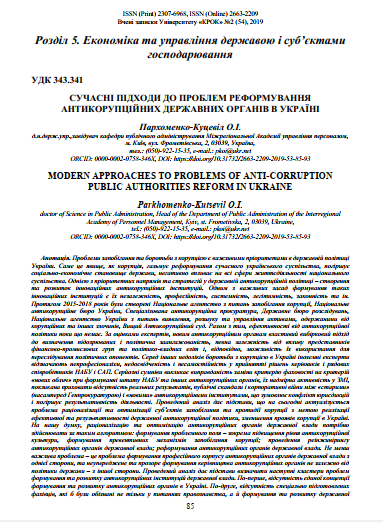СУЧАСНІ ПІДХОДИ ДО ПРОБЛЕМ РЕФОРМУВАННЯ АНТИКОРУПЦІЙНИХ ДЕРЖАВНИХ ОРГАНІВ В УКРАЇНІ
DOI:
https://doi.org/10.31732/2663-2209-2019-53-85-93Ключові слова:
корупція, антикорупційна держава, реформування, реінжиніринг, Національне агентство з питань запобігання корупції, Спеціалізована антикорупційна прокуратура, Антикорупційна стратегіяАнотація
Проблеми запобігання та боротьби з корупцією є важливими пріоритетами в державній політиці України. Саме це явище, як корупція, гальмує реформування сучасного українського суспільства, погіршує соціально-економічне становище держави, негативно впливає на всі сфери життєдіяльності національного суспільства. Однією з пріоритетних напрямів та стратегій у державній антикорупційній політиці – створення та розвиток інноваційних антикорупційних інституцій. Одним з важливих засад формування таких інноваційних інституцій є їх незалежність, професійність, системність, легітимність, законність та ін. Протягом 2015-2018 років були створені Національне агентство з питань запобігання корупції, Національне антикорупційне бюро України, Спеціалізована антикорупційна прокуратура, Державне бюро розслідувань, Національне агентство України з питань виявлення, розшуку та управління активами, одержаними від корупційних та інших злочинів, Вищий Антикорупційний суд. Разом з тим, ефективності від антикорупційної політики поки що немає. За оцінками експертів, новим антикорупційним органам властивий вибірковий підхід до визначення підозрюваних і політична заангажованість, певна залежність від впливу представників фінансово-промислових груп та політико-владних еліт і, відповідно, можливість їх використання для переслідування політичних опонентів. Серед інших недоліків боротьби з корупцією в Україні іноземні експерти відзначають непрофесіоналізм, недосвідченість і несамостійність у прийнятті рішень керівників і рядових співробітників НАБУ і САП. Серйозні сумніви викликає виправданість заміни критерію фаховості на критерій «нових облич» при формуванні штату НАБУ та інших антикорупційних органів, їх надмірна активність у ЗМІ, покликана приховати відсутність реальних результатів, публічні скандали і корпоративні війни між «старими» (насамперед Генпрокуратурою) і «новими» антикорупційними інститутами, що зумовлює конфлікт юрисдикцій і погіршує результативність діяльності. Проведений аналіз дає підстави, що на сьогодні актуалізується проблема раціоналізації та оптимізації суб’єктів запобігання та протидії корупції з метою реалізації ефективної та результативності державної антикорупційної політики, зменшення проявів корупції в Україні. На нашу думку, раціоналізацію та оптимізацію антикорупційних органів державної влади потрібно здійснювати за таким алгоритмом: формування проблемного поля – зокрема підвищення рівня антикорупційної культури, формування превентивних механізмів запобігання корупції; проведення реінжинірингу антикорупційних органів державної влади; реформування антикорупційних органів державної влади. Не менш важлива проблема – це проблема формування професійного корпусу антикорупційних органів державної влади з однієї сторони, та неупереджене та прозоре формування керівництва антикорупційних органів не залежно від політики держави – з іншої сторони. Проведений аналіз дає підстави визначити наступні кластери проблем формування та розвитку антикорупційних інституцій державної влади. По-перше, відсутність єдиної концепції формування та розвитку антикорупційних органів в Україні. По-друге, відсутність спеціально підготовлених фахівців, які б були обізнані не тільки у питаннях правознавства, а й формування та розвитку державної політики, вміли проводити фінансовий аудит, співставляти та аналізувати дані. Тобто виникла нагальна потреба у формуванні нової генерації фахівців антикорупційних органів державної влади. По-третє, відсутня система аудиту ефективності та результативності самих антикорупційних інституцій. Так, держава витрачає в рази більше коштів та ресурсів на створення та розвиток антикорупційних інституцій, ніж кошти та ресурси, які приносить діяльність таких органів державної влади. По-четверте, відсутні реальні механізми покарання за корупційні правопорушення. По-п‘яте, відсутній інститут добровільної конфіскації коштів при умові неможливості пояснити походження статків. Це давало б можливість винним особам уникнути кримінальної відповідальності або її пом’якшити. По-шосте, до сих пір не працює Вищий Антикорупційний суд, що зводить нанівець всі зусилля інших антикорупційних інституцій.
Завантаження
Посилання
Альтернативний звіт щодо оцінки ефективності державної антикорупційної політики 2015.
Аналітична доповідь до Щорічного Послання Президента України до Верховної Ради України «Про внутрішнє та зовнішнє становище України в 2017 році».
Бачинський І. С. Суб’єкти корупції – еволюція визначень. Теорія та практика державного управління. 2012. Вип. 4. С. 162-167.
Бєлік В. О. Поняття та структура механізму адміністративно-правової протидії корупції прокуратурою України. Порівняльно-аналітичне право. 2013. № 2-3. С 188-192.
Бутович О. Досвід кримінально-правової протидії корупційним злочинам у Франції. Вісник Національної академії прокуратури України. 2013. № 4. С. 90-94.
Волошенко А. В. Проблеми здійснення антикорупційних реформ в сучасній Україні та шляхи їх реалізації. Актуальні проблеми економіки. 2016. №8(182). С. 51-61.
Козуб В. П. Зростання ролі реординаційних відносини у системі державного управління. URL : http://www.irbis-nbuv.gov.ua/cgi-bin/irbis_nbuv/cgiirbis_64.exe?I21DBN=LINK&P21DBN=UJRN&Z21ID=&S21REF=10&
S21CNR=20&S21STN=1&S21FMT=ASP_meta&C21COM=S&2_S21P03=FILA=&2_S21STR=DeBu_2012_1_5.
Козьяков І. М. Координація протидії злочинності та корупції в системі функціональної діяльності прокуратури. Митна справа. 2013. № 5 (1). С. 23-28.
Литвиненко В. І. Протидія корупції в Україні: адміністративно-правові засади: монографія. К.: «МП Леся», 2015. 491 с.
Official website of The Organisation for EconomicCooperation and Development. URL: http://www.oecd.org/dataoecd/7/51/39972270.pdf.
Трепак В. Система заходів антикорупційної діяльності у розвинутих країнах світу. Публічне право. 2016. № 1 (21). С. 181-196.
Хачатурян Х. В. Реформування державного управління в контексті концептуальних управлінських інновацій. Державне будівництво. 2006. № 1. С. 12-15.


